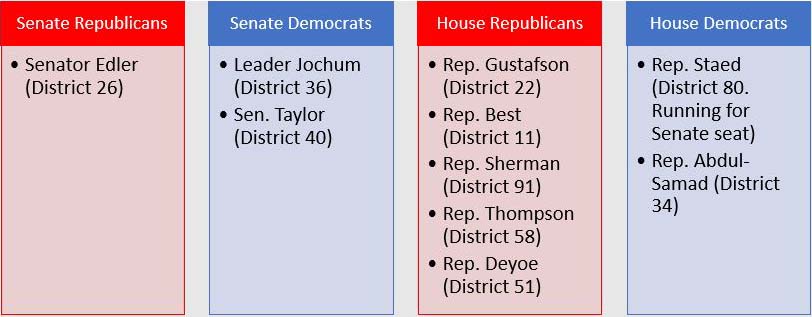The first funnel of the legislative session was a sprint to get as many bills passed through committees as possible. It was unusually busy, with more than 100 bills introduced since last Thursday, including successor bills that are still alive, and individual bills that were late to be introduced.
This funnel is the deadline legislators need to meet for a bill to remain “alive” and eligible for further action. To remain eligible for consideration this session, a bill must be voted out of committee in its chamber of origin by today (the close of Friday, February 16). There are limited exceptions for appropriations, tax, and leadership bills. The goal of the funnel is to narrow the focus of legislative priorities.
The majority of funnel week was consumed with committee action. Once bills receive approval from the full committee, they will be renumbered, reprinted, and become floor-eligible in their originating chamber. If a bill does not have a companion in the other chamber, the process becomes more challenging.
Below is a brief snapshot, not an exhaustive list, of the bills that survived the first funnel. Read on for an in-depth analysis of top legislative priorities and where they stand.
| HF 2097 Exempting Places of Worship Through Disaster Proclamation |
| HF 2114 Mobile Device Filters for Minors |
| HF 2176 Grocery Reinvestment Fund |
| HF 2236 Released Inmate Medicaid Coverage |
| HF 2255 Minor Social Media Accounts |
| HF 2289 Lyme Disease Testing |
| HF 2375 Dietician Compact |
| HF 518 Firearm Rights Damages |
| HSB 198 Work Without Worry |
| HSB 599 AI Campaign Uses |
| HSB 608 Eminent Domain Matters |
| HSB 642 Governor Contraceptives |
| HSB 643 Governor Post-Partum Coverage |
| HSB 662 Paid Parental Leave |
| HSB 664 Governor Reorganization Corrections |
| HSB 670 Gender Balance on Boards |
| HSB 673 Charter Schools Funding Formula |
| HSB 674 Soil & Water Matters |
| HSB 675 School Guards & Employees |
| HSB 686 Work-Based Learning |
| HSB 691 Nursing Home Citations |
| HSB 707 Texting & Traffic Camera Ban |
| HSB 710 Repeal of Boards and Commissions |
| SF 2041 School Administrator Contracts |
| SF 2081 Medicare Supplement Open Enrollment |
| SF 2214 Insulin Price Cap |
| SF 295 Guardianships & Conservatorships |
| SSB 3079 Pharmacy Benefit Managers |
| SSB 3119 Governor Rulemaking Procedures |
| SSB 3137 Dental Care Networks |
| SSB 3138 Genetic Information Releases |
| SSB 3146 Governor Behavioral Health Service System Bill |
| SSB 3164 Community College Funding |
Legislative Activity
Significant Bills Surviving First Funnel
Education
State Supplemental Aid
Another week has passed without a resolution on FY 2025 State Supplemental Aid (SSA). The annual deadline for this bill is 30 days after the start of the session, but February 8 came and went with no plan for the K-12 school funding. A shell bill (SF 2258) exists in the Senate and advanced through the funnel. On Thursday, the House Education Committee advanced HSB 712 which would set SSA at 3% for the upcoming school year and HSB 714 which raises the minimum starting salary for teachers. The Governor recommended an increase of 2.5% for the per-pupil state aid; last year’s SSA came in higher than her request as well, at 3%. The increase in starting pay for first-year teachers was initially proposed in Governor Reynolds’ AEA bill and would have raised teachers’ minimum starting salary to $50,000, as well as set a $62,000 minimum salary for teachers with at least 12 years of experience. HSB 714 sets the minimum salary slightly lower, at $47,500 in school year 2024-25, and then to $50,000 in 2025-26. The current minimum salary for first-year teachers in Iowa is $33,500.
Area Education Agencies
The day before the legislative deadline, the House released a new approach to Area Education Agency (AEA) funding in Iowa. The new bill (HSB 713) would send federal special education funding directly to AEAs, instead of to school districts as is drafted in the Governor’s bill. The changes would not take effect until the 2025-26 school year, at which point school districts could begin to work with private entities for other services the AEAs currently provide, like general education services. The bill was advanced by a subcommittee on Thursday and the full House Education Committee the same afternoon.
The Senate Education Committee passed SSB 3073 this week as well. This is the Governor’s version of the AEA proposal, meaning there are two versions still at play. More details on this bill can be found in the Week 4 blog post.
Gender Definitions
On Tuesday, the House Education Committee held a public hearing on HSB 649, which brought a large group of protestors and advocates to the Capitol. The bill requires the use of a person’s biological sex at birth on documents like birth certificates or driver’s licenses, including one issued after a gender transition. Opponents of the bill said that the bill will discourage trans Iowans from staying in the state and will make them less safe. They said that the language of the bill is unclear, and that doctors and others will have problems interpreting the bill and implementing the bill. Supporters of the bill said that it would protect women and children in restrooms and locker rooms and called the language in the bill common sense.
The bill was amended and passed the House Education Committee on party party-line vote. There is no Senate companion bill.
State Government
Boards and Commissions
The highly anticipated Boards and Commissions Review Committee bill was introduced this week, but with competing language in the House and Senate, questions remain about which version will ultimately be signed. The Senate bill (SSB 3172), introduced by the Governor, outlines the review committee’s proposal to consolidate or cut 111 of Iowa’s existing 256 boards and commissions. The Senate State Government committee advanced the bill on Wednesday along party lines.
The House State Government Committee, however, advanced HSB 710 which focuses on eliminating or merging just 49 boards and commissions. Representative Bloomingdale, Chair of the House State Government Committee, indicated the possibility of further amendments to the bill but was satisfied with using the bill as a starting point. The House bill garnered more bipartisan support from the committee, and some Senate Democrats have urged the Senate to take up HSB 710 instead.
Gender Balance on State Boards
The House State Government Committee voted 15-8 to advance legislation repealing Iowa’s gender balance requirement for boards and commissions. HSB 670 would implement one of the recommendations of the Iowa Boards and Commissions Review Committee and eliminate the requirement that state panels have equal gender representation. Proponents of the bill have said they believe the law is antiquated and the most qualified candidate should be considered, regardless of their gender. Rep. Adam Zabner argued that the gender balance requirement should be kept, just like requirements for political affiliation or geographic location on certain boards. He cited that only about 60% of boards and commissions are currently gender-balanced, and current law allows for the requirement to be dropped if a candidate that meets gender balance requirements cannot be found in 90 days. The bill’s companion SF 2096 passed the Senate State Government Committee earlier in February.
Election Laws
On Wednesday, the Senate State Government Committee voted along party lines to advance SSB 3161. The legislation would make several changes to Iowa election laws, such as allowing federal candidates convicted of felonies on Iowa ballots. Other measures include changing deadlines for absentee ballots to be turned in to county auditors and bans on alternatives to in-person voting like ballot drop boxes and ranked-choice voting. The House companion bill (HSB 697) was advanced by the House State Government committee this week, making the legislation funnel-proof in both chambers.
Public Land Acquisition
The Senate Natural Resources and Environment Committee voted 9-4 to advance a bill placing restrictions on Department of Natural Resources (DNR) property purchases. SF 2324 prohibits the DNR from acquiring property except from willing sellers and donors, meaning the DNR cannot bid on land from a non-profit that obtained it at auction. The House companion bill (HF 2104) did not survive the funnel, so it will have its work cut out in that chamber.
Public Safety
Firearms in Schools
The House Public Safety Committee voted 13-8 on a bill aimed at encouraging school districts to arm staff and employ school resource officers or private security. The bill would provide schools with up to $50,000 in matching funds if they hire school resource officers or private security. The bill also allows teachers and other school staff to carry a firearm if they pass several training courses and receive a permit.
The committee amended the bill to allow school boards to opt out of the original requirement that high schools with more than 8,000 students would have a security officer. School boards would have to determine who pays for weapons and permit fees, who provides training, the type of firearms allowed, and how they must be stored.
Hands-Free Driving and Speed Cameras
The Senate Judiciary Committee voted 10-8 to advance a bill that both bans drivers from using cell phones outside of voice-activated or hands-free modes and bans the use of traffic enforcement cameras by state and local authorities to enforce traffic laws. These two issues have been introduced separately in previous sessions but are combined in SSB 3016.
Law enforcement officials spoke in support of the hands-free provision at a January subcommittee meeting but asked for lawmakers to remove the traffic camera provisions, saying the technology helps reduce accidents and uphold traffic laws. Proponents of the traffic camera bans maintain that cameras are more about revenue generation than about public safety. The companion bill HSB 668 did not receive a subcommittee meeting but a similar bill, HSB 707 passed out of the House Transportation Committee so the issue is alive in the House as well.
Health and Human Services
Birth Control
Governor Reynolds introduced a bill that would make hormonal birth control available from pharmacies without a doctor’s prescription, similar to other behind-the-counter medications. The House Health and Human Services Committee advanced HSB 642 on a 17-3 vote with support from both Democrats and Republicans. The bill provides for check-ins and risk assessments between the pharmacist and patient for up to two years before the patient would need to see a physician to refill the prescription.
Postpartum Medicaid Coverage
A bill to expand postpartum Medicaid coverage from 60 days to 12 months passed the House Health and Human Services Committee this week. If passed, Iowa would be the 48th state to expand this coverage for mothers and infants. While supportive of the increased timeline, Democrats raised concerns about shrinking the population allowed to access such coverage. The bill would reduce the qualified income limit to 215% of the federal poverty level. The Senate companion (SF 2251) was approved by the Senate Health and Human Services (HHS) Committee in February, and conversations continue on both sides.
Nursing Home Inspections
The House HHS Committee also passed a bill allowing the Department of Inspections, Appeals, and Licensing to review allegations of substandard care and provide additional evidence via documentation before issuing a citation. The bill also provides that inspectors and nursing home industry officials would participate in joint training sessions to review the violations that occur most commonly in Iowa.
Behavioral Health
The Governor’s bill to reorganize the state’s behavioral health system, which we discussed in-depth last week, was advanced by the Senate HHS Committee on Wednesday. SF 2354 would establish a statewide Behavioral Health Services System, dividing the state into seven districts instead of the current 13 mental health and 19 substance abuse regions. The Department of Health and Human Services would be tasked with negotiating contracts in each district to provide mental health, substance abuse, and addiction recovery services. The matching bill in the House (HF 2509) was advanced by the House HHS Committee on Thursday and referred to Appropriations for more committee work.
Executive Branch Update
This week the Governor requested a Presidential Disaster Declaration for 18 Iowa counties to recoup costs related to snow removal, de-icing, salting, sanding of roads and other eligible facilities, and other emergency protective measures incurred during the January winter storms. It was estimated that the significant snowfall resulted in more than $8 million worth of damage that is eligible under the Federal Emergency Management Agency’s (FEMA) Public Assistance Program.
Governor Bill Introductions
Here is a brief overview of where the Governor’s priorities stand at the end of the first funnel:

*The House proposed its own version of a bill to implement BCRC recommendations, see above.
Retirement Tracker
Representative Ako Abdul-Samad announced his retirement on Thursday at the annual Black History Month Celebration Day on the Hill. Abdul-Samad is the longest-serving Black lawmaker in Iowa; he started serving in the House of Representatives in 2007. He currently serves as Ranking Member on the House Local Government Committee. The legislator is a well-known community activist and founder of the nonprofit Creative Visions.
Additionally, Senator Waylon Brown (R) announced his plan to run for re-election this week.



What’s next?
The focus of the coming weeks will be advancing bills through the full chambers so they can be assigned and considered in the opposite chamber before the second funnel deadline of March 15. There are four weeks until the second funnel, which is effectively 16 legislative days.
The full 2024 Session Timetable can be found here.


